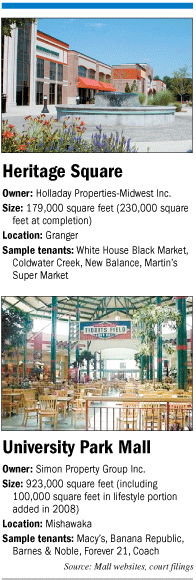Subscriber Benefit
As a subscriber you can listen to articles at work, in the car, or while you work out. Subscribe Now
One of Indiana’s largest privately held developers is suing Simon Property Group Inc., alleging the nation’s
largest mall owner abused its “market power” to bully two national retailers into backing out of leases at a lifestyle
mall near Mishawaka.
An entity tied to South Bend-based Holladay Properties Inc. alleges in court filings in St. Joseph County that Simon used
“anti-competitive tactics” to pry Ann Taylor Loft and Lane Bryant, committed tenants of its Heritage Square lifestyle
mall, to open stores in the nearby Simon-owned University Park Mall instead.
Holladay says Simon also tried unsuccessfully to persuade Coldwater Creek and Eddie Bauer to back out of lease deals at the
230,000-square-foot Heritage Square, which broke ground in 2006.
In the case of Eddie Bauer, Holladay claims Simon CEO David Simon personally appealed to the retailer’s CEO to break
the Heritage Square deal and open in Simon’s answer to the new Holladay-owned mall: a 100,000-square-foot lifestyle
component added in 2008 to University Park Mall.
Simon for years has leveraged its vast power with national retailers to thwart efforts by competitors to open viable shopping
centers, claims Holladay, which has developed $2 billion worth of real estate in 15 states, including AmeriPlex-branded business
parks in Indianapolis, South Bend, Merrillville and Portage.
“One former Simon employee reported that there was a big meeting of various Simon executives concerning Mishawaka in
which they discussed their intent to kill the Heritage Square deal,” Holladay attorneys allege in the lawsuit, filed
April 22. “This former Simon employee also indicated that Simon’s tactics regarding Mishawaka is like what happens
all over the country.”
Simon Property Group says in court filings that its actions in Mishawaka were nothing more than “the intense cajoling,
negotiating, and horse-trading one would expect when landlords compete for tenants in the highly competitive market for commercial
real estate.”
The company, which declined to discuss the case with IBJ, has called for a judge to dismiss the lawsuit on the grounds
Holladay failed to allege any antitrust violation—“conduct that has no legitimate business purpose, sacrifices
short-term profits, and makes sense only because it eliminates competition.”
The Simon filing says the Heritage Square mall has managed to compete “vigorously” with the Simon-owned mall,
winning at least four of the most sought-after tenants for lifestyle retail centers: White House Black Market, Coldwater Creek,
Eddie Bauer and Aveda.
Simon also points out that Lane Bryant had a store at the Simon-owned mall and was targeted by Holladay—which in doing
so “engaged in the same conduct it says Simon engaged in.”
 The Indianapolis-based company also points out that any interference with the lease agreements would have
The Indianapolis-based company also points out that any interference with the lease agreements would have
occurred more than two years ago, outside the statute of limitations for such allegations.
Women’s wear retailers Ann Taylor Loft and Lane Bryant were poised to open at Heritage Square in 2006 but later backed
out and opened in University Park instead.
The Holladay entity alleges Simon used a series of tactics to lure the retailers to its center, including “refusing
to renew existing leases or making renewals conditioned upon the tenant not opening stores in a competing development in another
market” or “increasing rates or otherwise making the terms of renewals less favorable in retaliation if a tenant
opens a store in a competing center.”
Simon’s interference made Heritage Square less attractive to other potential tenants, driving down rents and impairing
the property’s value by “tens of millions of dollars,” said Henry J. Price, an attorney for Holladay and
partner in Indianapolis-based Price Waicukauski & Riley LLC.
“They’re trying to get retailers—regardless of quality or location of a property—to effectively deal
exclusively with Simon, in Simon properties or certainly not in properties that compete with Simon,” Price said.
The lawsuit says an appraisal when construction began in 2006 put the value of Heritage Square at $46.3 million. An updated
figure was not available, Price said. Holladay still controls the mall, which is anchored by a Martin’s Super Market,
and has not defaulted on any loans, he said. The company declined to provide occupancy figures for the property.
Simon has faced numerous similar lawsuits over the years as it acquired competitors and became the nation’s largest
publicly traded real estate company.
A shopping center developer in Texas alleged in a 2006 case, later settled out of court, that Simon intervened to prevent
a Macy’s store from taking space in a non-Simon center. A co-developer with Simon in the Forum Shops at Caesars in Las
Vegas alleged that Simon reduced the value of a partner’s stake by offering retailers cheaper rent in Las Vegas in exchange
for taking less desirable space elsewhere.
The Federal Trade Commission is looking into possible antitrust issues relating to Simon’s pending purchase of 22 Prime
Outlets malls. Some of the malls’ tenants are concerned the $2.3 billion deal, announced in December, would give Simon
too much power over retailers.
Anti-competitive concerns also helped prevent Simon from succeeding in a $10 billion bid earlier this year to take over its
chief U.S. rival, the debt-laden Chicago-based General Growth Properties.
Competing bidders, including Canadian real estate giant Brookfield Asset Management Inc., argued that combining the nation’s
top two mall owners would stifle competition among retail landlords and attract attention from federal authorities.
“At a minimum, regulators would likely conduct a full-scale investigation into the threat to competition posed by Simon’s
proposal, delaying the transaction for months,” a Brookfield official wrote in an April letter to the General Growth
board.•
Please enable JavaScript to view this content.
